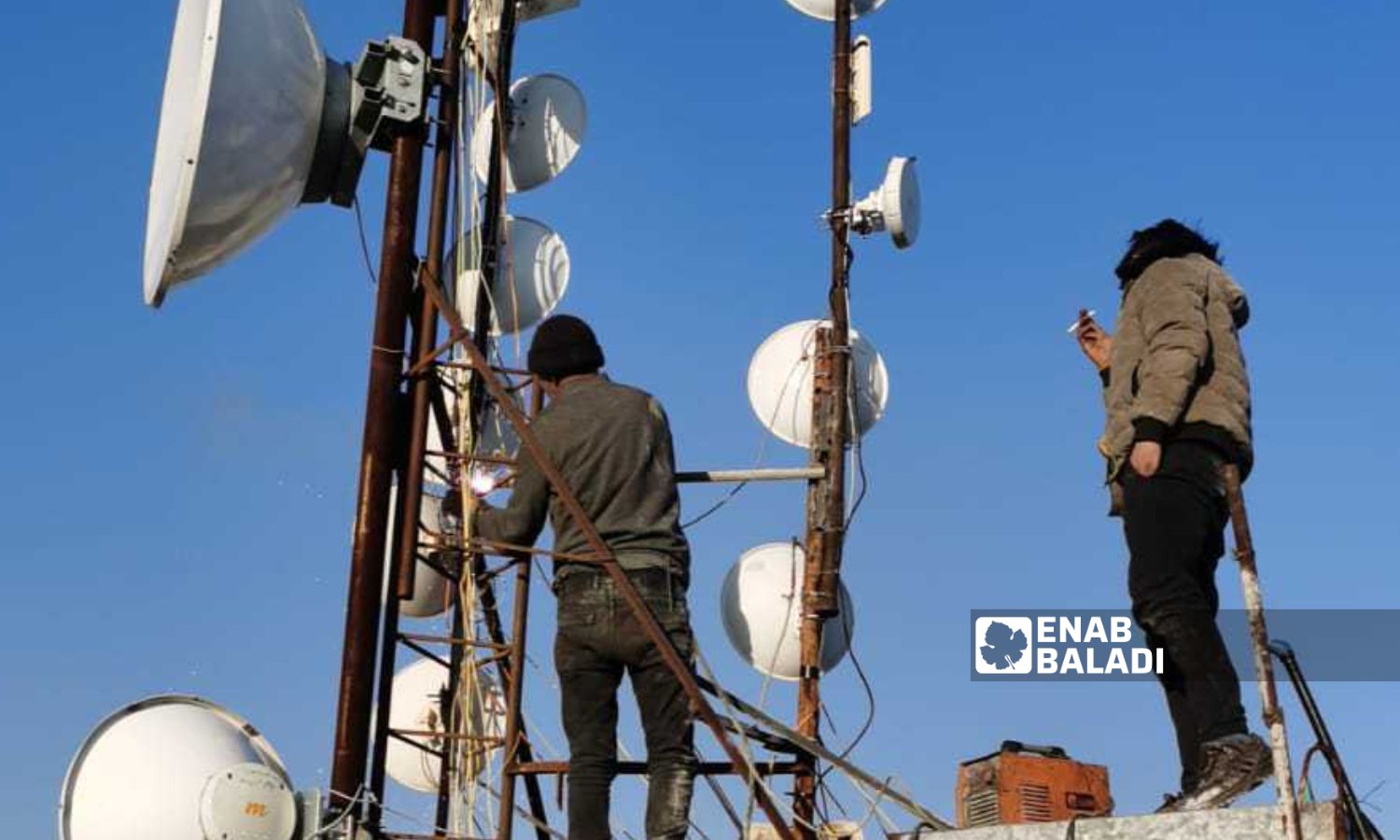



Enab Baladi – Idlib
The interruption of the internet networks increased the tension and anxiety of Mohammad Obaid, who toured the streets of the city of Idlib seeking internet connection after the massive earthquake rocked the northwestern region on February 6, to find out the areas hit by the earthquake and to ensure the safety of his family and relatives.
The condition of Obaid, in his forties, is similar to that of tens of thousands of people who rushed to their phones to check on their families and relatives in the places hit by the earthquake at a time when electricity and internet networks were disrupted in most of northwestern Syria.
Many internet networks provide their services in northern Syria, most of which were cut off due to the earthquake, which put the people in isolation from the world for hours, and some of them opened communications for free.
Obaid told Enab Baladi that he went out to the street with his family as the buildings shook and the earthquake occurred, and after checking on the family members, he wanted to communicate with his father and brothers residing in Turkey.
It was dawn, the shops were closed, and the power outage prevented the use of home internet, so Obaid started looking for satellite internet networks that offer free minutes of communication to callers in the city streets.
Although he was able to connect to one of them, the internet speed was very slow due to the heavy use on these networks and the interruption of communications with his father and brothers in Turkey.
The earthquake that hit southern Turkey and four Syrian provinces affected the work of the internet and electric networks, which were damaged, as were other facilities and infrastructure.
The earthquake resulted in 2,274 deaths and 12,400 injuries in northwestern Syria amid a rise in the number of deaths in Turkey to more than 43,000 people.
Some Turkish telecommunication networks operate in some areas of northern Syria close to the Turkish border. As for the areas that are relatively far from the border, the people there rely on satellite and terrestrial internet networks.
The people of Idlib depend mainly on satellite internet networks and “DSL” networks provided by communication centers, and there are some internet lines that operate with mobile SIM cards, such as “E-lux” and “Syriana” networks, but these networks are very expensive.
The price of one package reaches $15 (283 TL), and three dollars for a monthly package. These amounts are considered high in relation to the economic and living conditions of the people of the region.
The director of the “Al-Fatah” communications network operating in Idlib, Abd al-Rahman Mustafa, told Enab Baladi that he began assessing the damage and repairing the network hours after the earthquake occurred.
Mustafa added that the power outage caused the network to stop working, some of the network cables were intermittent, the satellite receivers shook, and some of them fell from their place, and they needed to be redirected to restore the network.
He also mentioned that since the supply of electricity in the city of Idlib in 2015, most of the networks rely on electricity instead of batteries and solar panels.
The network workers mobilized to secure generators and batteries to operate network servers and providers and broadcasting devices. Then, they began redirecting receivers, replacing the cut cables, and making sure that the Internet reaches the people free of charge, according to Mustafa.
The “Al-Fateh” network covers large parts of the city of Idlib and a number of neighboring villages, such as Kafriya, al-Foua, Zardana, Kafr Yahmoul, Killi, and a number of IDP camps.
As with many establishments in different sectors, the internet networks suffered damages and losses, as the earthquake resulted in the collapse of more than 550 buildings, more than 1,570 buildings were partially damaged, and thousands of buildings and houses were cracked throughout northwestern Syria.
Dozens of networks operating in the region provided free internet services to the people during the first days of the earthquake, and some of them are still continuing after about 20 days, such as the “Al-Fateh” network, according to its manager, who stated that it provides free internet until the situation stabilizes.
Mohammad Yaman Shabash, owner of the “Nassim Net” network in Idlib, told Enab Baladi that the damage to the networks did not stop on the first day of the earthquake, as the aftershocks permanently affected them and led to the fall of the reception dishes or their failure to point in the right direction.
It also led to the disconnection of network cables in some cracked buildings, forcing network owners to perform periodic and permanent maintenance after the aftershocks, which numbered in the thousands.
The director of the “Al-Fateh” network explained that the work did not stop, and shifts were held around the clock voluntarily by workers to fix faults that could occur even in the late hours of the night.
Mustafa, the director of the “Al-Fateh” network, pointed out that the networks incurred great losses due to the damage they suffered after the earthquake, and what increased their losses was the provision of fuel for the generators and permanent transfers between the receivers and transmitters located in separate buildings in the city and neighboring villages, to ensure the effectiveness of the network permanently without any financial return.
Hussein al-Masri, director of the Public Telecommunications Corporation in the Syria Salvation Government (SSG) in Idlib region, said in a statement that the corporation directed the owners of satellite internet networks to provide free internet for seven days, coinciding with the earthquake.
Al-Masri mentioned that the corporation will compensate them later and that it has worked to maintain the landlines of the Internet, in addition to providing its centers with internet broadcasting devices for the benefit of the people in all regions.
Enab Baladi’s correspondent in Idlib, Anas al-Khouli, contributed to this report.
if you think the article contain wrong information or you have additional details Send Correction